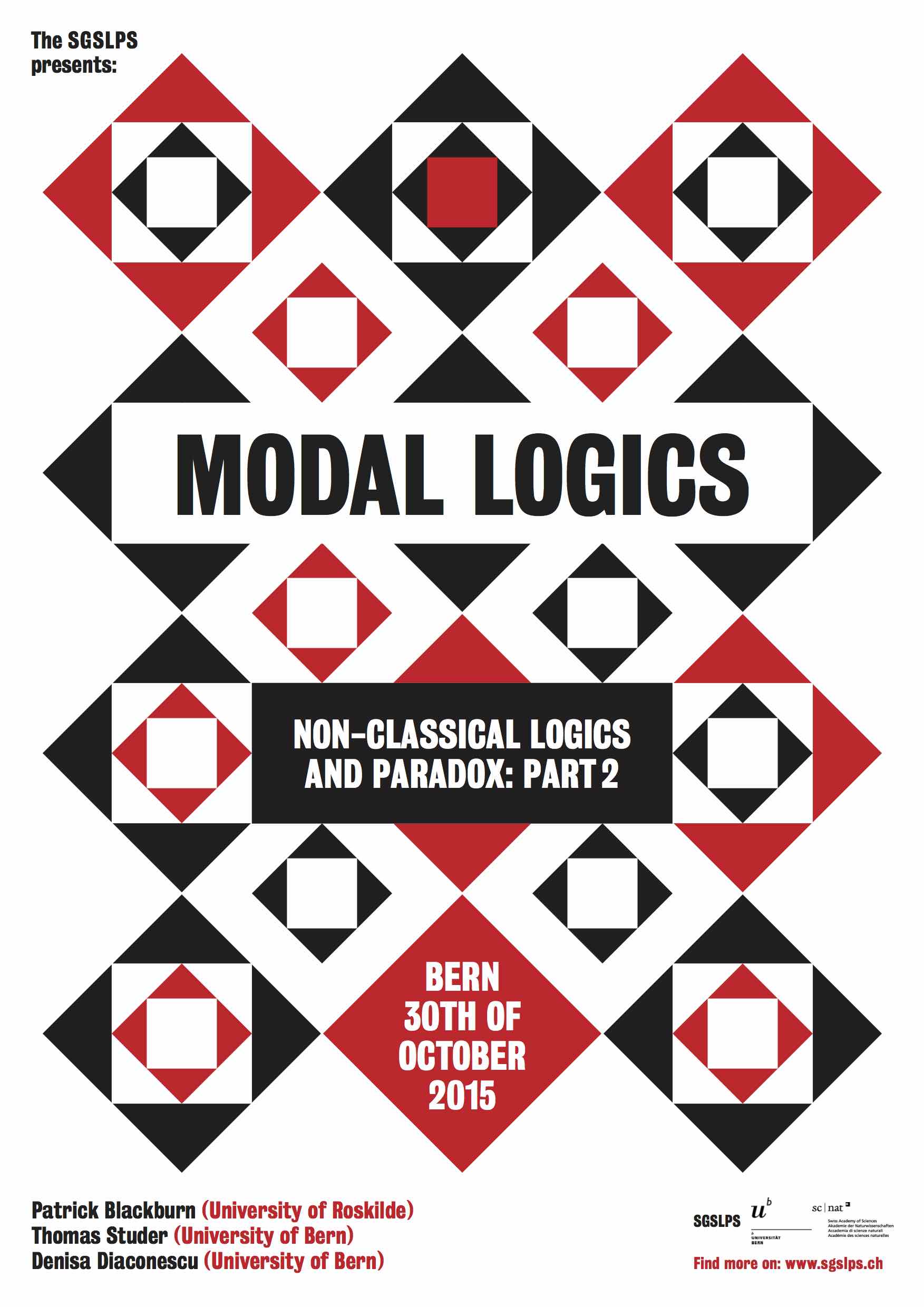
About Modal Logics
This workshop on Modal Logics completed a two-part series on Non-Classical Logics and Paradox. While the first part of the series was devoted to Many-Valued Logics, logics that feature more than just two truth values "true" and "false", the focus of the second part was on logics for capturing different ways (or modes) in which statements can be true or false. Most notably, a claim such as "2+2=4" may not only be true, but necessarily so in virtue of universal mathematical laws. On the other hand, it may only possibly be the case that the sun will shine in Bern on the 30th of October 3015. Besides "necessarily" and "possibly", prominent modalities also include epistemic, deontic, and temporal qualifications, such as "Pete knows that", "it is obligatory that", and "it is now the case that", respectively. Many different but related logics for these modalities have been developed in the past. They are now frequently applied in the formal analysis of philosophical argument, in computer science, AI, and related fields.
Abstracts and Slides
Patrick Blackburn
What is Modal Logic and Why Do We Like It?
The main purpose of this tutorial talk is to introduce propositional modal logic, and to do so from an Amsterdam perspective. I will begin by presenting modal logic in a fairly traditional way – discussing its Kripke semantics and saying something about its axiomatics. But I will then switch to noting its sheer ubiquity (modal languages can be used for many different applications) and this will swiftly lead to a discussion of modal expressivity and the standard translation of modal logic into first-order logic. Which raises an obvious question: why not discard modal logic and work with first-order logic instead? The van Benthem Characterisation Theorem provides a satisfying answer, one which both tells us what propositional modal logic is, and goes a long way towards explaining why we like it so much.
Thomas Studer
Introduction to Justification Logics
Traditional modal logics feature formulas of the form "Box A" that stand for "the agent knows that A". The classical semantics for these logics is given by possible world models, in which the formula "Box A" is true if "A" is true in all worlds that the agent considers possible. However, this approach is missing the justified part of Plato's classic characterization of knowledge as justified true belief. Justification logics can fill this gap. Instead of formulas "Box A", the language of justification logics includes formulas of the form "t:A" that mean the agent knows "A" for reason t. The evidence term t in this expression can represent a formal proof of "A" or an informal reason why "A" is known. Moreover, justification logics include operations on these terms to reflect the agent's reasoning power. For instance, if "A implies B" is known for reason s and "A" is known for reason t, then "B" is known for reason s.t, where the binary operation . models the agent's ability to apply modus ponens. In our talk, we give a short introduction to justification logic and present the main results in this area.
Patrick Blackburn
One Small Step: From Modal to Hybrid Logic
My second talk – which will also have a tutorial flavour – takes up the story where my first left off. I will begin by pointing to an obvious asymmetry in modal expressivity: although modalities give us useful expressive power with respect to the accessibility relations, orthodox modal logic does not let us name the underlying worlds (or times, or states, or people, or ...) making up Kripke models. So we take one small step and add nominals, special propositional symbols true at unique worlds; this takes us to hybrid logic where the distinction between terms (which name) and propositions (which have truth values) is blurred. The remainder of the talk explores the consequences of this step. I will briefly note the van Benthem style characterisation theorem which holds for propositional hybrid logic, but my focus will largely be on the hybrid logic’s deductive properties and completeness theory.
Denisa Diaconescu
Many-Valued Modal Logics
The framework of classical logic is not expressive enough to reason with vague concepts or modal notions like belief, uncertainty, knowledge, obligations, etc. Many-valued modal logics are appropriate frameworks for overcoming these limitations. A main question in the study of many-valued modal logics is: What is the many-valued counterpart of the minimum classical modal logic K? In this talk we will try to give an answer to this question. As case studies, we will consider Gödel and Łukasiewicz modal logics.